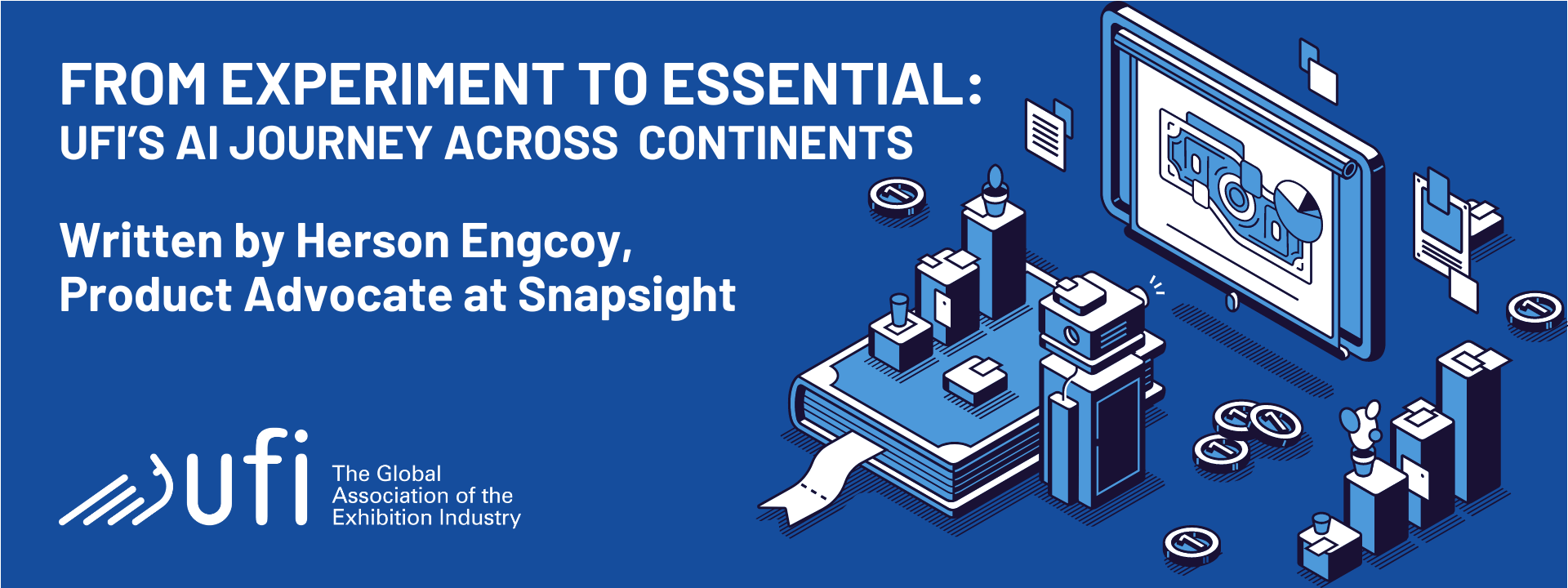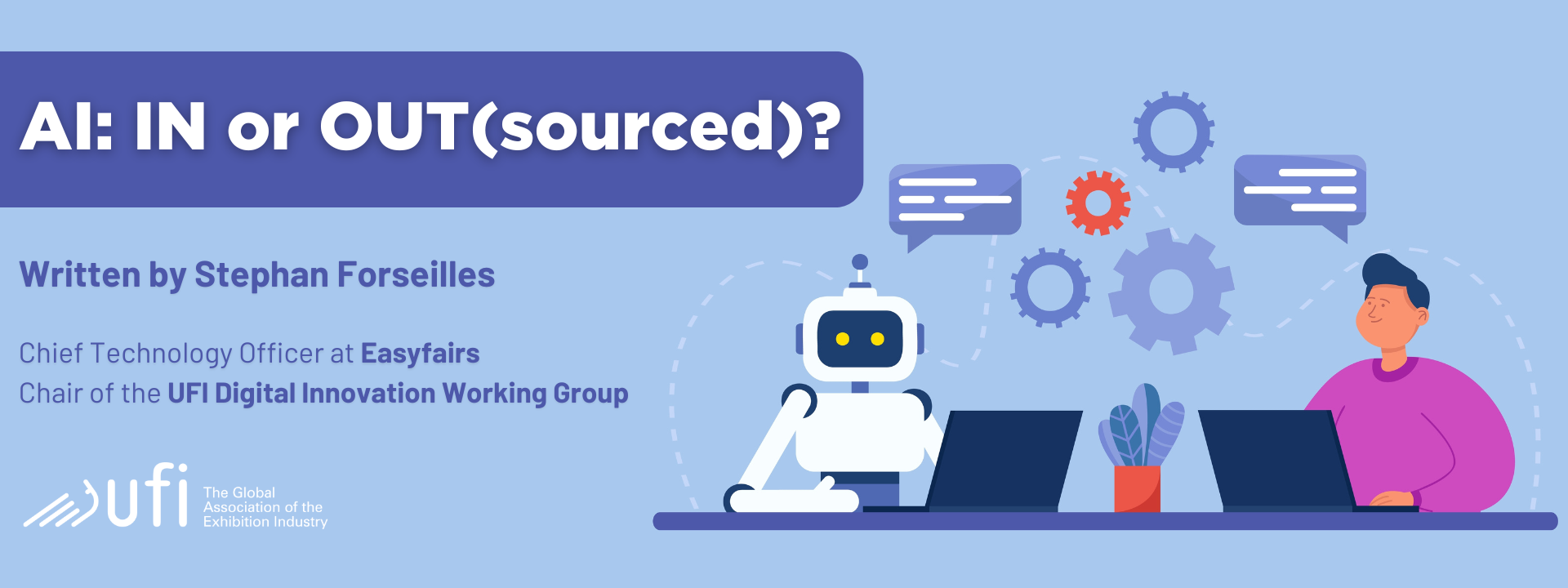
Gunnar Heinrich, CEO, adventics GmbH.
At the high-profile UFI Asia-Pacific Conference in Tokyo, Stephan Forseilles, Tesi Baur and I had the pleasure to debate several controversial topics about the digital revolution in our exhibition industry. With the help of the audience which could vote in real time, we took a closer look at A.I., customer experience, digital talents and digitization in the exhibition industry. Here is a wrap-up of our discussion.
1. Will A.I. change our industry completely?
Obviously, Artificial Intelligence is a topic that is important for almost everybody in the industry: Nearly 70% of the delegates believe that A.I. will change our industry completely. But the sceptics also presented a strong counter-argument: We are first and foremost a “face-to-face industry”. As a result, leaving the core of our business to an algorithm would be like letting a tool plan a wedding party. In short, only real people can organise a real trade show.
Those who did believe in the power of A.I. talked of the many great ways in which A.I. is already helping to bring people together, such as the Deep Text or Crystal project. It is also not so hard to imagine a future where systems such as Outlook would be able to recommend trade shows to us based on the type of key stakeholders in our business life. Such a function in its own right would change the very basis of our industry.
We do not know yet how A.I. will affect our industry, but it is important to discuss its pros and cons and possible solutions.
2. Are trade shows providing an outdated customer experience?
Tons of e-mails, printed mail, generic, often slow websites, long registration processes… Time-consuming, inconvenient journey (poor connection to the airport, traffic, parking) queueing, seemingly random (or worse, paid-for) match making proposals, bad coffee, no place to sit, carrying around a truckload of printed brochures… Both digitally and in real life, some aspects of trade shows have not changed much since a long time and are way behind what some other industries offer. This is why, in my opinion, we force our customers to deal with too many, often outdated, systems all along their journey. Tesi Baur does not completely agree: He has seen many examples of well-integrated and user-friendly exhibitors and attendee portals. But they are too rare, he admits. So, we’ve asked the attendees of UFI’s Asia Pacific Conference if they think that our industry is offering an outdated customer experience.
A very honest and self-critical view: Almost 90% of the attendees thinks that our industry is really offering a less-than-average and outdated customer experience and needs to get its act together.
We are convinced that trade shows will remain important for businesses and individuals in the future, maybe even more than now. But if we want to continue to be relevant as actors of our industry, we urgently need to put the customer experience back at the centre of our preoccupations and start acting on it!
3. Are the rarest digital talents attracted by the exhibition industry?
Digital is a big shift, both for businesses and people. Digital talents are crucial to face the exponential change. But they are rare and searched by everyone, from the super-hype tech start-ups to the high-paying consultancy and banking firms. Exhibition organisers are neither of those: They have the image of a traditional business and are not the best-paying industry in the world. So why would those rare talents consider working for the exhibition industry?
Tesi Baur thinks we can attract them, but we can’t keep them: He has seen many such profiles joining the industry, but lots of them have left the industry within three years. I am even less optimistic: We use relatively old technologies, our IT budgets are low compared to other industries and organisers are often state-owned companies with extensive red tape and a low appetite for innovation. This has to change! We have to re-think our culture and finally understand the digital shift. And the audience seems to agree.
Almost 80% of the audience thinks that there is a chance that we are skipped by the best talents. 48% even strongly agree.
So, let’s get in shape and work on our employer branding as an industry, or we might end up struggling to keep the people who are the key to our future!
4. Is the exhibition industry only doing a “pseudo-digitalization”?
Exhibitors, visitors and members of the supervisory council – everyone is demanding better digital services and innovation. As a consequence, there are various digital initiatives in our industry. Implementing the role of a Chief Digital Officer with an entire team seems common best practice. But just leaving your tie at home and wearing white sneakers to your suit doesn’t make an agile organization. And it doesn’t help to launch a multi-year salesforce project when you are using the system like your Outlook before. Why are we approaching projects with Big Data and A.I. if we are still struggling to get our Small Data under control?
The audience seems to agree that our industry still has to go a long way towards digitalization:
The vast majority agrees that it’s still not about true digital transformation. If there is no real cultural change in the companies, for example, we can keep on spending budgets without really harvesting the fruits of a true digital transformation. So, let’s get in shape and truly work on our digital future!
Want to join the discussion? Register for the UFI Digital Innovation Forum in Birmingham on May 15th 2019, join our LinkedIn group UFI Digital Innovation, and follow @UFIDigital on Twitter.











Artificial intelligent most powerful tools in technologies that connect the machine with human no one can imagine what will the future without AI this is the right way to choose best way to represent your ideas
Dear Mr. Heinrich, thank you for sharing your key insights following the Tokyo debate. Digital* (*with all its suffixes) has become such a buzzword across industries, hence no wonder it is discussed controversially also in the exhibition industry.
I`m not sure I understand the buzz about AI; I think that “the industry” still has some ground to cover with regard to more “mundane” matters of importance to exhibitors and visitors alike. One hardly needs AI to imagine that the exhibition industry will have to put its best foot forward to understand and satisfy customer needs and ecosystems better in order to stay relevant.
Kudos for being so outspoken about some of the “minor” concerns the industry has been facing for… well… probably the last couple of years. I totally support your rally for cultural change which has to come ahead of digital transformation (or at least alongside with it) – it sounds like a wake-up call. What could be possible if industry leaders were a little less in love with “the old ways” and prepared to reinvent themselves and the industry to actually serve their CUSTOMERs better?
A lot has been said, and rightly so, about visitors and their needs and expectations. However, I think the industry has to think of EXHIBITORS as their customers first. Why is that? Exhibitors are no longer so convinced they will come back time and again just for the sake of being present “at the fair”. (We all know they’re spending up to half of their marketing budgets on fair participation).
What is the exhibition industry really doing to support loyal and new (!) exhibitors throughout their journey (before/during/after the event and between events)? (How) does it educate them about the true potential of trade fair participation and its contribution to the bottom line? Is it still selling booth space without proving its “net worth”?
Best,
Karin Reiter
bludonau projects
Messbar mehr Messeerfolg
Thanks for sharing all of your experiences!
Really informative, thanks for sharing this!
Really informative, thanks for sharing this!
Awesome post! Keep up the great work!